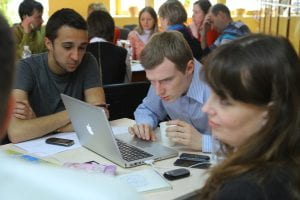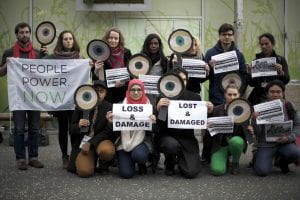by Professor Gwen Seabourne, University of Bristol Law School

The common law of England, in the medieval centuries and long afterwards, was man-made law: created by and in the interests of free men, drawing on and reinforcing ideas of women as inferior. Its assumption of the superiority of men was intensified during marriage, with the wife’s identity defined in relation to her husband, her legal personality subordinated to his in important respects. Studying the documentation left behind by those making, administering and using the common law in medieval England provides ample confirmation of the disadvantages and limitations which were imposed upon women and the hierarchical nature of marriage. Amongst the many records which seem to show settled, hierarchical ideas, there are, however, occasional glimpses of subtler thinking and richer detail, serving both to nuance our view of medieval thinking about medieval law and gender, and also to expand our understanding of the lives of medieval women, up to a point. Such glimpses can be found in the documentation relating to an episode in the later fifteenth century, and subsequent legal action, which I will note here.[i]
A northern English landowner, Sir John Assheton, alleged that, on a November night in 1470, a group of more than 200 ‘riottours’, headed by a certain John Myrfeld and Richard Ledys, attacked his manor of Howley (Morley, Yorkshire). They were, he said, brandishing a fearsome array of weapons, and they came with trumpets and horns blaring, damaging his property pulling walls down and deliberately setting fires, and causing considerable fear to his household, including his wife, her female companions and his servants. He himself had been taken away to nearby Pontefract Castle, and made to seal a bond for £1000 in their favour, obliging him to do what they wanted. He petitioned for the aid of king (Edward IV) and parliament, to ensure that he was able to take effective legal action against multiple miscreants.
So far, so stereotypically masculine: men and property; men and violence; men and their weapons; an exclusively male parliament and legal profession; a male monarch, a wife whose name is not thought worth noting. There are, however, valuable references to women, and hints about gender ideas, in the petition in which Assheton told this story, and in the wider body of documentation on the case.
In the petition, Assheton suggested that the attack was particularly serious because of its effect on his wife and the women attending her. His anonymous spouse had, he said, just had a baby, and was still ‘in child-bed’. She was very frightened by the attack, then and for a long time afterwards. Assheton did eventually say that he experienced ‘fere’ but only after he had attributed even stronger emotions to his ‘wif’, describing her as being ‘in right grete dispare of hir lif’, and noting that the ‘gentilwomen’ who were with his wife, shared her feelings.
In addition to the emotional impact on his wife, he also stressed the danger which would have been involved in moving her away from the scene of the attack: at that point just after her delivery: moving her would be a risk to her life (putting her in ‘ieop[ar]dy of hir deth’). The possibility of death in or after childbirth was much on the minds of medieval people, and the petition also alludes to one of the ways in which they might choose to improve the chances of a good outcome. Describing the situation of his wife, Assheton’s petition mentions that she was, at the time of the attack, lying ‘in the bandes (or, in one instance, ‘bondes’) of ‘Our Lady’. This important, and rather intimate, detail, referring to the Virgin Mary and the possibility of her assistance in childbirth, might conceivably be metaphorical, but I think that it is rather more concrete than that, and indicates the use of a particular supernaturally-charged device: the birth girdle. Such belts, or girdles, inscribed with prayers for the safety of the wearer, and sometimes invoking the aid of Mary, have aroused the interest of historians of medicine, religion and gender for some time, and a recent scientific study of one surviving girdle gave strong evidence of the fact that it was actually wrapped around the body of the woman during childbirth. This documentary evidence may extend understanding of the use of such objects a little, suggesting as it does that a woman might remain girdled for a time after the delivery, and also that the use of the girdle was sufficiently well-known to laymen to make it a useful ‘plot element’ in a non-specialist medical or religious narrative.
The other detail of the petition’s birth story which is worth emphasising is the surrounding of the labouring and newly-delivered wife by other women, confirming the idea of confinement as a period in which one would expect female-only company (unless there was some emergency). While male medical professionals were increasingly claiming gynaecology as part of their intellectual domain,[ii] this account reinforces the idea of childbirth usually being a women-only event.
Clearly, John Assheton (or whoever drafted his petition) did not set out to educate posterity about medieval childbirth, women, or gender, and, as is always the case, we are in no position to draw conclusions about the truth or otherwise of his story. Nevertheless, its details (the fear, the girdle, the exclusive female space of the birthing chamber) were no doubt assumed to be plausible, and that in itself gives us valuable insights. The childbirth part of the story must also be considered as part of a strategy to maximise the chances of raising the sympathy of those hearing the petition, and gaining their influential support for his action against those he accused of attacking his manor.
The tactics employed appear to have been both emphasising the serious effects of the attack (in that it caused fear, and risk, to a vulnerable woman), and also drawing a contrast between the good order and righteousness of the Assheton household and the disturbing disorder (the ‘horrible riott’) of the attackers. Good order was shown by the use of respectable invocation of the Virgin Mary, and the propriety of the women-only space in which the birth took place. We also hear something about who these women are: they include the sisters of John Assheton, ‘gentlewomen’ and ‘friends’: a very respectable gathering, in social terms.
The picture of propriety is strengthened by the description of the exclusively female birthing chamber as an arrangement ‘accordyng to the lawes of god and womanhode’. This is a strong statement about law, gender and childbirth. It raises what seems to have been common practice to the status of a law, and a law with divine backing at that. It also grants imaginative legal status to practices or preferences connected with women and gender. In this phrase, and in this context, women are aligned with God, and treated (for rhetorical purposes) as if they were not wholly excluded from contemporary law-making. This raises all sorts of questions about ideas of both ‘lawe’ and ‘womanhode’, and about how this concept relates to the description more usually encountered in medieval works on matters of obstetrics and gynaecology, the rather less positive idea of the ‘secrets of women’.
The bands, or bonds, of Our Lady, righteously employed in a childbirth scene in the Assheton household, also, perhaps, provide a subtle contrast with the bond Assheton himself claims to have been obliged to seal, or to the coerced nature of his removal to Pontefract Castle: devices for comfort and protection set against devices for control and abuse.
These childbirth details may also have been used to bolster Assheton’s own masculine identity. The petition goes on to state that he had submitted to the ‘riottours’ and gone off with them, but this is explained as an act of sacrifice, for the benefit of his wife and others present. Giving details of her situation could well have been a way of recategorizing his conduct in gender-appropriate terms, should anyone have thought it less than properly manly. The confirmation of his reproductive success might, perhaps, be a useful burnishing of his masculine credentials.
Whatever it was that swayed those who heard Assheton’s petition, it succeeded, and he was indeed able to take action at common law as he had desired, against at least some of those involved in the events of 1470. In some instances, there was settlement of the claims,[iii] but one at least rumbled on for some years, as the records of the common law courts in 1476 and 1477 demonstrate.
As luck (for the modern scholar) would have it, this case caught the interest of common lawyers, and was noted amongst the selected reports which have come down to us as ‘the Year Books’. This reporting was done for reasons of the case’s importance with regard to a technical pleading issue, rather than a fascination for childbirth, girdles or gender. The Year Book does, however, provide a very clear, and telling, illustration of the variation between narratives used for different sorts of legal, or law-adjacent, proceedings. Gone, in the common lawyers’ account, is the whole childbirth story, female companions and holy girdles and all. Assheton’s wife is mentioned, since the claim is that she was ousted from the land. This is something of a change to the story: in the petition version, Assheton submitted to the ‘riottours’ in order to save his wife and the others present: he, not she, was the one removed from the manor. As the Year Book reports it, the defendant chose to make his argument on a basis other than this inconsistency, however, so it was left unexplored. Medieval records do have a way of not pressing the issues which seem most important to us. It is evident from these differently-angled proceedings, however, that a man like John Assheton was able to deploy his wife in his legal manoeuvres as he saw fit. Despite this apparent usefulness, and for all of the hints in the documents about the experience of childbirth, the suggestions of reverence for Our Lady and the high talk of ‘the lawes of womanhode’, in the end, the real, individual, woman, remained obscured in the legal sources: in the Year Book report and the plea roll, just as in the petition, the name of John Assheton’s wife was not regarded as being worth recording. That, too, seems worthy of note.
Gwen Seabourne is Professor of Legal History at the University of Bristol Law School and co-director of the Centre for Law and History Research. She is also one of the organisers of the British Legal History Conference 2024, which will take place in Bristol from 3rd – 6th July.
[i] The National Archives, Kew, KB 27/858 m.66 ff; see also KB 27/859-862; SC 8/29/1443; Parliament Rolls of Medieval England, 1472 no. 57; YB Pasch. 16 Edw. IV f. 2a pl. 6.
[ii] See, in particular, M. Green, Making Women’s Medicine Masculine: The Rise of Male Authority in Pre-Modern Gynaecology (Oxford, 2008).
[iii] Assheton reached a settlement with one of the main movers in the attack on his land, Thomas Wortley, in a deal which included the arrangement of a marriage between Wortley’s son and Assheton’s daughter.










